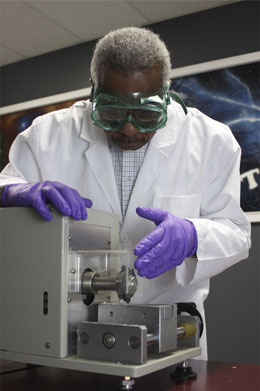by DONNA CURRIE

He sold that business and created a new business that made upcycled products. That turned into a recycling business which he built to over $30 million in sales, with nearly 300 employees, globally. TerraCycle isn’t a typical recycling company, since they specialize in recycling products that are particularly difficult. Simpson said that they’re really more of a “boutique recycler.”
When they work with a company, they’re more than happy to pick up metals that are sent directly to a smelter, and they’ll handle industrial glass and plastic as well, but they’re much more interested in the odd and complicated items, like baby diapers, juice pouches and cigarette filters.
While diapers might seem like an odd thing to recycle, Simpson said that about six percent of the material in landfills is disposable diapers, so removing them from the waste stream saves a lot of space and salvages a lot of usable material. To recycle those diapers, first they’re sterilized, then the outer plastic is separated from the absorbent material. The plastic is washed again, shredded and can be used for things like plastic tiles or plastic lumber. Meanwhile, the absorbent material ends up as a fertilizer.
Chewing gum can also be recycled, according to Simpson. Today’s chewing gum, unlike the original, is plastic based rather than plant based. It may be hard to imagine where large quantities of used chewing gum might be collected to make recycling worthwhile, but Simpson said that in Mexico there are municipalities that have containers were people can dispose of the gum, which is eventually shipped for recycling.
TerraCycle recently introduced a new platform for consumers called Loop, where people can sign on to buy a reusable tote filled with products they choose such as shampoo, spices, oils and even ice cream. Consumers use the products, toss the empty bottles and packages into the tote, and ship it back to TerraCycle. This has only been rolled out in a few areas of the country, but they expect it to be available nationwide soon.
Simpson, a “polymer scientist,” might not be the usual recycling employee. Before TerraCycle, he had worked for a number of large companies doing research, until he retired in 2007. He wasn’t ready to quit working, though, so he helped a few friends with their startups, then joined TerraCycle in 2010 to help them develop a recycling process. Now, he spends his time analyzing materials from all over the globe to figure out how it can be recycled.
He works along with the company’s outstanding marketing team who help sell the company’s capabilities and who get samples for analysis to see if recycling is actually possible before “we can take their material en masse for recycling.”
Besides working with large companies and their industrial products, TerraCycle also works with household items that come from schools or arrive via UPS from customers who purchase the zero waste boxes for materials they can’t recycle locally.
Much of the difficult to recycle products are plastics, which are eventually converted to granules that are sold to companies who make plastic products. “We pay people to produce granules,” Simpson explained. TerraCycle writes the processes, and those are handled by companies “who can perform the processes that we write.”
Potato chip bags, made from multi-layered films, generally aren’t considered recyclable, but TerraCycle has a process to handle them and other #7 plastics that no one else can handle. “Our logo is on millions of packages,” Simpson said, which means they can recycle those items. While it makes no sense to put a single potato chip bag in an envelope and mail it in for recycling, if someone collects enough bags, it might make sense to send them in for recycling and keep them out of the local landfill.
Looking forward, Simpson expects they’ll always be looking at new technologies because “complex materials need complex processes.” He expects there will be increased efforts to develop the new technologies needed to efficiently recycle as many materials as possible.
Another effort might be to figure out how to produce clean materials for the end user when the recycling process starts with food-contaminated products, and without having to wash the materials before recycling.
While TerraCycle seems to have a firm grasp on recycling the impossible, Simpson said that one problem in America is that people can easily put recyclable materials in with their trash and there’s no one stopping them. Along with recycling efforts, Simpson would like a mandate established that requires a reduction in materials approved for landfill so more products can get a new life through recycling.
Published in the July 2019 Edition